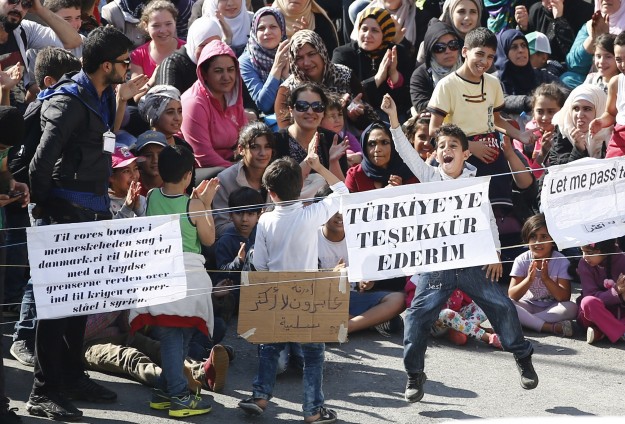Emad is just one of around 3,000 refugees – mostly from Syria – who have gathered at Istanbul’s main bus station, a large complex on the city’s European side.
The collection of men, women and children have been waiting for the last three days at the station for officials to allow them to travel to the Turkish-Greek border, 230 kilometers [130 miles] away in Turkey’s western Edirne province.
Some carried banners reading: "Thank you, Turkey". Others read: "Let us go."
Their arrival came after some rumors on social media said that Germany would accept thousands more refugees.
However, Istanbul’s governorship released a statement claiming that those "reports are groundless".
"Convincing efforts in order to prevent them [refugees] from going to Edirne continue. As a result of these efforts, around 500 Syrians turned back," it added.
Many refugees want to try their chance of entering the EU again by arriving in Greece.
However, for Emad – who was a carpenter in Damascus before arriving in Turkey three weeks ago – there is no alternative to a life in the EU:
"We will try to go by bus. If they will not allow us to go by bus, we will try to go by boats or by walking. We will ask for our rights in Europe that the UN gives us, as a refugee."
Seventy-year-old Rashid Sarmu, who was running a shoe factory in Aleppo, is one of the oldest refugees waiting at the station. He has been living in Istanbul for two years. When his two sons went to Germany, he tried to find a way to join them there.
Rashid even tried – twice this month alone – to go to Greece from Turkey’s western province of Izmir by boat, but faced extreme danger when the crafts capsized.
“The Turkish coast guards rescued us there. Now, we will try the bus choice, to go to my children,” he says.
“If they will not allow us, I don’t know what to do," he adds: "What I know is that we cannot return back to our homeland.”
Raed al-Mollah, 28, was sitting on the ground at the bus station, together with his 24-year-old wife Nana.
He was studying journalism in Syria. Because of the war, he, together with his wife and family had to go to Iraq three years ago.
Raed could not finish university. He now hopes, by coming to Istanbul, that he can go to university in one of the European countries and work as a reporter.
"I am hopeful that we will go to Europe anyway and establish a new life there."
More about:
















































